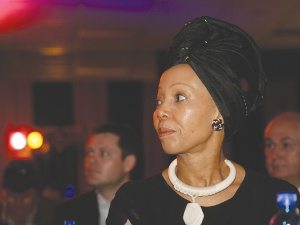
[miningmx.com] – ASKED in September about the status of Bridgette Radebe’s Mmakau Mining in Total Coal South Africa (TCSA), the company for which Exxaro Resources had just bid R4.9bn, Exxaro’s recently appointed CEO-elect, Mxolisi Mgojo, picked his words carefully.
“She is a shareholder right now,’ said Mgojo. He then declined to be more specific when pressed: “Like I’ve just said, as we stand right now, Bridgette Radebe’s Mmakau Mining is a shareholder in TCSA,’ he said.
The question was worth asking because the theory going round was that as a black-owned company, Exxaro Resources had no need of Mmakau Mining as a partner. It, therefore, made sense to buy the minority shareholder out.
According to an industry insider, however, Mmakau Mining had not yet paid for its stake in the mines. As a result, there’s some discussion whether Mmakau’s investments are simply forfeit.
An alternative is that in order to ease the transaction through, a notional value can be ascribed to Radebe’s stake which can be netted off against the sum Exxaro Resources is willing to pay for the company provided Radebe’s debt isn’t the larger. Either way, the issue is a fraught one and as previously reported by Miningmx, Radebe is thought to be digging her heels in.
Mmakau Mining first made its investment in TCSA’s assets in the teeth of the minerals and metals super-cycle taking a 26% in both the Brakfontein and Dorstfontein colleries, and a 13% stake in TCSA’s Forzando mine.
However, the coal price had risen and fallen precipitously since Mmakau’s first investment; the decline was especially hard since 2008 falling from way over $100/t in 2013 to about $60/t today.
In its 2013 financial year, TCSA’s assets booked a R55m loss whilst details on the performance in 2014 is still hard to come by (but it can’t be pretty).
According to Wim de Klerk, CFO of Exxaro, TCSA won’t lift the veil on many more details about its assets until a Section 11 certificate has been received from the Department of Mineral Resources (DMR), a document which consummates the transaction as it allows for a change in ownership.
Exxaro has been waiting nearly eight months for the ownership change, quite a long time even by the DMR’s standards.
It’s thought that Radebe’s Mmakau is doing its best to frustrate the deal until she knows how the sticks will fall for her under Exxaro’s control. Attempts by Miningmx to make contact Radebe to verify some aspects of the speculation about her business activities were unsuccessful.
Radebe is the sister of Patrice Motsepe, executive chairman of African Rainbow Minerals, and the wife of Jeff Radebe, minister in the presidency and a long-standing member of the ANC serving as a minister in every administration since 1994.
Right now, times are troubled for Radebe’s Mmakau.
Founded in the Eighties, Mmakau Mining was taken up by Rand Merchant Bank as the next major mining house in the footsteps of Motsepe who, from the late Nineties had begun to set down the foundations for ARM.
Radebe scored an early success buying a 25% stake in Shaft Sinkers for about R31m, which was subsequently increased to a 36% shareholding, and which was then realised once Shaft Sinkers listed in London. (Ironically, Radebe has since criticised the foreign listings of South African mining companies as they capitalise on transfer pricing).
Radebe also realised some value from her shareholding in Madibeng Platinum which was sold to Eland Platinum which, in turn, was sold to Xstrata for about $1bn. Eland Platinum has since proved a non-starter. It currently sits within Glencore following its buy-out of Xstrata.
Elsewhere, however, Radebe’s Mmakau Mining has suffered set-backs.
Marula Platinum, in which Mmakau has a 9% stake, is being sold by its majority shareholder, Impala Platinum (Implats), which demonstrates that the mine isn’t performing to its preferred levels.
Terence Goodlace, Implats’ CEO, said the mine is a solid operation, but it’s not good enough to stay within the Implats stable amid the “lower for longer’ platinum price that the platinum producer expects.
Mmakau also has a 6.5% stake in Hernic Ferrochrome through the Sayora Minerals vehicle, but the ferrochrome market is difficult and volatile, whilst a 75% stake in Zimbabwe’s Eureka gold mine has come to naught. The mine has been closed down.
Asked if Radebe was digging her heels in at TCSA, an analyst said; “Yes. She’s proving a problem for Exxaro’. For its part, Exxaro Resources won’t comment on the matter saying the issue is sensitive at the current time.
Perhaps the best outcome of all for Radebe, and even Exxaro Resources, is for the deal to fail, according to an article in Miningmx which cited analysts as saying that the further deterioration in the coal price since the offer last year has made the rationale for the deal less attractive.
If the TCSA deal goes through, there is a risk Exxaro could end up taking an impairment charge against the assets acquired. Such a development would be highly embarrassing given that Exxaro has just taken a R5.8bn impairment charge against the Mayoko iron ore project.
The source cited by Miningmx added: “Maybe this acquisition made sense at a Richards Bay coal price of around $85/t. At current coal prices around $60/t it does not.”
The terms of Exxaro’s TCSA deal specified a “drop dead date” of six months post the signature date for completion which would have been in January this year. But it also provided for two extension periods of six months each which would push the “drop dead date” back to January 2016.











